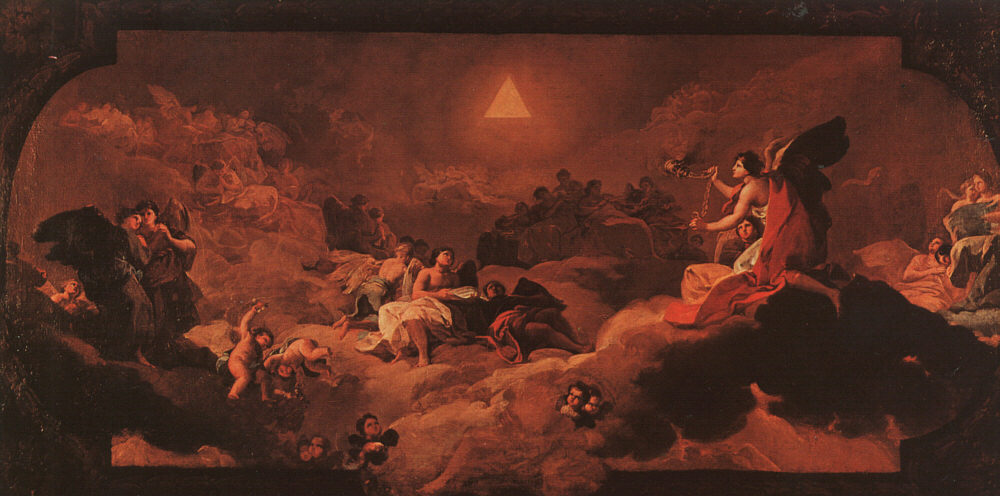Returning to my Lost In the Cosmos series (the beginning of which can be found here), I'd like to return to the matter of what faith actually is to a Catholic. I touched on this in my first post of the series, but it was from the perspective of what the Church proposes for our belief; now I'd like to look at it from the viewpoint of the believer, or the possible believer.
When I was a kid, my mother was a fan of Ken Ham, or at any rate we had a lot of stuff by him. I seem vaguely to recollect seeing him give a talk once, but perhaps I was too young to distinguish reality from TV yet.
Some parts of that journey into distinctions were more painful than others.
Anyway, what I absorbed from Ham and those like him was an attitude that many people, both within and outside Christianity (not a few of whom have left Christianity because of this), believe is how Christians are supposed to think: namely, a monomaniac insistence on the inerrancy of the Bible and the complete untrustworthiness of every other source of knowledge, and a rejection of all argument when it comes to establishing the truth of the Christian revelation. Fideism is the technical name for this outlook; blind faith is the vernacular.
Given that the Catholic Church professes to be infallible, and that her history of dealing with those of her children who have come to dissent from her teaching is not a pretty one, a lot of people assume that Catholicism is an officially fideist religion. This, sadly, does not exclude Catholics, some of whom make a positive virtue out of not examining any part of their beliefs, thus shutting themselves out from intelligent sympathy not only with non-Catholics, but even with fellow Catholics who have difficulty with this or that article of the faith -- and there are many difficult articles of Catholic belief, for, even more so than most branches of the Christian tradition, the Roman Church proposes many things for our belief that are, well, pretty hard to believe. That animation should be restored to dead tissue (i.e. the Resurrection); that alien intelligences should operate on the cosmos without any material vehicle (i.e. the activities of angels); that human beings should be invested with the power of disclosing the mind of the Divine Absolute to one another (i.e. the teaching office of the Church and the sacrament of Confession); that this same Divine Absolute should choose under certain circumstances to make Itself objectively and personally present in bread and wine (i.e. transubstantiation): all these things take a good deal of believing; and if the Jesus on whom our faith is based was not to proud to accept the plea, "Lord, I believe; help thou mine unbelief," perhaps we should not be too proud to keep good fellowship with it.
But I digress. The truth is, though the Catholic Church has her share of professing fideists, and of people who are fideists in practice even if they would disown the title, she has gone out of her way to say that, when she speaks of faith, that is neither what she means nor what she desires of the faithful. The First Vatican Council, though most famous for defining papal infallibility as Catholic doctrine, also insisted that some things can be known about the world and even about God apart from any faith.
Faith is not synonymous with uncertainty, but there's a way in which it can't be torn apart from uncertainty -- the two are conjoined without division, without change, without confusion, without separation, as it were. Pope Benedict, quoting to begin with from the works of the great Jewish author Martin Buber, wrote:
'An adherent of the Enlightenment, a very learned man, who had heard of the Rabbi of Berditchev, paid a visit to him in order to argue, as was his custom, with him, too, and to shatter his old-fashioned proofs of the truth of his faith. When he entered the Rabbi's room, he found him walking up and down with a book in his hand, rapt in thought. ... Suddenly he stopped, looked at him fleetingly, and said, "But perhaps it is true after all." The scholar tried in vain to collect himself -- his knees trembled, so terrible was the Rabbi to behold and so terrible and simple his utterance to hear. But Rabbi Levi Yitschak now turned to face him and spoke quite calmly: "My son, the great scholars of the Torah with whom you have argued wasted their words on you; as you departed you laughed at them. They were unable to lay God and his Kingdom on the table before you, and neither can I. But think, my son, perhaps it is true." ...'
Here we have, I believe -- in however strange a guise -- a very precise description of the situation of man confronted with the question of God. ... [B]oth the believer and the unbeliever share, each in his own way, doubt and belief, if they do not hide from themselves and from the truth of their being. Neither can quite escape either doubt or belief; for the one, faith is present against doubt; for the other, through doubt and in the form of doubt. ... Perhaps in precisely this way doubt, which saves both sides from being shut up in their own worlds, could become the avenue of communication.
... Can we still believe at all? Or rather -- for the question must be posed in a more radical fashion -- is it still permissible to believe? ... When some theologian explains that 'the resurrection of the dead' simply means that one must set about the work of the future afresh every day, offense is certainly avoided. But are we then really still being honest? Is there not serious dishonesty in seeking to maintain Christianity as a viable proposition by such artifices of interpretation? ... An 'interpreted' Christianity of this kind that has lost all contact with reality implies a lack of sincerity in dealing with the questions of the non-Christian, whose 'perhaps not' should worry us as seriously as we want the Christian 'perhaps' to worry him.*
In other words, as His Holiness says in the same book, faith is not an intellectual rejection of certain possibilities as non-existent. It is, rather, a decision, in the face of myriad possibilities, to trust that one among those possibilities is actually true. Catholic faith in particular is the decision to trust that God is this kind of being (the Trinity), and has behaved in this specific way (the Incarnation and Redemption), and can therefore be known, now and here, by these means (the Church and her Scriptures and Sacraments).
The Adoration of the Name of the Lord
Francisco Goya, 1772
Fideists like Ken Ham display, through their blockheaded refusal to countenance any possibility but one, not faith but the lack of it. The whole point of faith (as an act -- the content of faith is, of course, something else) is to hold fast to something, which isn't necessary if only that one thing even exists. To trust your spouse is one thing; to say that everybody is either lying, stupid, or crazy except your spouse, as a means of perpetuating your trust in your spouse, is ... well, something else.
And this, by the way, is why a Catholic need not and should not fear any of the traditional enemies and rivals of Christian faith. 'Christianity, if true, has nothing to fear from honest inquiry,' said Bishop Kallistos Ware. The advances of the sciences, claimants of supernatural or magical powers (whether false or true) from other religious traditions, corruption of every kind in the Church herself, the mere brute pain of life -- all these things are the perhaps which we, as Christians, ought to allow ourselves to be troubled by; they are the environment in which the word faith has meaning. And we can hardly invite those outside to a faith that we excuse ourselves from entering into, in its twilit glory.
Evil and suffering are here particularly relevant -- especially when they are, or are caused by, the sins of Christians. And Christians have sinned a great deal; we have scandalized the earth; the fact that we are, for some people, a hissing and a byword, cannot be put down merely to the hatred of darkness for light. Shutting one's eyes to evil and suffering, or giving non-answers like 'It's always darkest before dawn' (which didn't work out so neatly for, say, the victims of Auschwitz-Birkenau or the Japanese who survived Nagasaki only to die of radiation poisoning), is a false move -- and, when you come to think of it, an insulting one. For it implies that horrible things do not matter. The militant atheist who refuses to believe in a God who would allow such things to happen, and the hyper-Calvinist devil-worshipper who believes God would cause men to do these things and then damn them for it, both take such offenses more seriously than the cloying, Precious-Moments-y whitewasher who can say God never closes a door without opening my mouth from the comfort of an overstuffed armchair.
Look at these dipshits.
Anyway. The point is, when we speak of faith, we are, obviously, not speaking of reason; nor, as the Church has vehemently argued for centuries, of irrationality. (It has been drily pointed out before now that there is nothing specially rational about dismissing all forms of knowledge except reason, especially since reason does not clearly prompt us to do so.) Neither are we speaking of certainty, of 'blind faith' so-called, any more than we are speaking of a mere 'Well, maybe this whole Christianity thing is true' when we sing the Pange Lingua during the Maundy Thursday procession. What we are speaking of is a personal decision of trust; one that is, necessarily, prefaced by getting to know this Person well enough to decide whether we shall trust Him. And this getting-to-know will naturally take a multitude of forms -- that's to be expected when you are, according to the premise, getting to know the author and fountain of Being -- including reason.
My own reversion to belief was of exactly this kind. I had tensed myself up to maintain the blind fideism I absorbed as a child, afraid to be honest with myself, fearing the consequences of thinking things for no reason except that I thought they were true; and finally, my intellect caught up to me. I just couldn't sustain the covert dishonesty any more. Fideism snapped, and faith now had a chance. And, increasingly, since that time, I've been coming to understanding the tension in which faith exists -- a different kind of tension from the kind I had been using to try and sustain my fideism.
There is no way to prove this: nevertheless, my belief is that, if Christians are willing to experience in ourselves this sacred tension between uncertainty and conviction, our perhaps not can indeed communicate with the perhaps of the non-Christian. It may even be, within the natural exchange and substitution of the coinherence of mankind, the supernatural coinherence can be invoked, and God can make us who know faith to be faithlessness for the unfaithful, and thus communicate faith to those who could not or would not take it for themselves.
*Introduction to Christianity, pp. 46-47, 56-57.



No comments:
Post a Comment